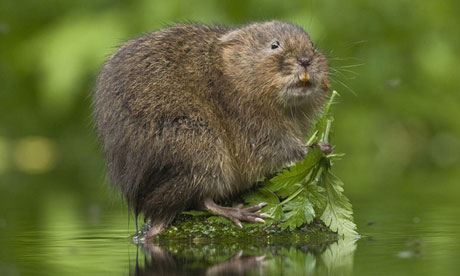Tadpoles this spring will be facing more than the usual predatory threats of fish, birds and children with jam jars. Amid the worst drought in 30 years "a wildlife tragedy" is looming that could inflict a heavy toll on some of England's best-loved species.
As well as the risk of tadpoles of frogs, toads and rare species such as the great crested newt, dying if ponds dry out, pressure is growing on water voles and wading birds, and fish are already dying in numbers as habitats dry out, the Environment Agency warns.
Agency staff have been removing fish from some ponds and rivers and placing them elsewhere, but this action is not feasible at every affected spot.
Some once-common bird species, such as lapwings and curlews, whose populations have declined rapidly in recent years, could vanish altogether from smaller breeding sites, experts warn.
Helen Perkins, of The Wildlife Trusts, said: "A wildlife tragedy is unfolding in parts of the country. After such a long period of low rainfall, some species may not recover and could be lost from some rivers and wetlands if we don't act now."
Some areas of the country have suffered their driest 18 months since records began, and almost all of the east and south-east of England is now officially in a state of drought.
At least seven water companies plan restrictions such as hosepipe bans, to come into force next month, and it is thought the drought could be felt as far north as Yorkshire and as far west as Wiltshire later in the spring. Water companies are looking at ways to share water, but transporting water over long distances is extremely difficult and costly.
Only an extended period of much higher rainfall levels than normal could prevent a serious drought now, and the forecast is for a continuing dry spell.
The soil is so dry in many parts of England that rainfall a fifth higher than normal would be needed to restore it. Many reservoirs are only half full after two dry winters. And rainfall from now on is less likely to recharge soils because more of the water will be lost to vegetation and less will stay in the ground.
Caroline Spelman, the environment secretary, has called on households to save water. She said "The recent drought summit I held at my department highlighted the threats of a dry winter to various parts of the country, and it's likely that more areas will follow Anglia into drought unless there is significant rainfall over the next few months.
"We can all help reduce the effects of drought by being smarter about how we use water. Taking action now to reduce how much water we use will help us all in the future."
However, the picture is not uniform. Scotland, Wales and the far north of England, have still got good supplies of water, and South West Water, which serves Devon, Cornwall and parts of Dorset and Somerset, said it was "in a good position" with reservoir levels at 85% of normal.
South West Water attributed its position to the upgrades made to the distribution network since the 1976 drought, the transformation of two china clay pits into reservoirs, and action on leakage.
Other water companies, such as Thames Water, have come under fire for failing to fix leaking pipes.
The Environment Agency said it was planning to help protect nationally important wildlife sites by altering the way it licensed organisations for the abstraction of water from rivers and underground sources – by allowing, for instance, higher pumping rates if any rainfall did occur.
Some of the worst affected species will be water birds, which need wetland breeding sites and moist soils to probe for their food.
Phil Burston, water policy officer at the RSPB, said: "Wading birds like lapwings, redshanks and avocets rely on shallow pools and boggy marshes. As we come into the breeding season, if these birds manage to breed at all, their chicks will need to feed on the insects that live close to the edge of pools. If [the ponds] dry up then the chicks will be forced to look elsewhere, putting them in danger."
He said snipe, redshank, lapwing, curlew and black-tailed godwit, were all species that had declined rapidly in numbers in recent years.
Burston said that even the RSPB's wetland reserves, which are carefully managed to preserve water and wildlife, would face difficulties. He predicted that outside the nature reserves the situation would become "desperate".
Dragonflies and other aquatic insects, on which birds and fish feed, are also among the likely victims, if streams, ponds and shallow lakes are dry before their larvae form. And shrinking rivers and lower water levels in ditches and streams expose the burrows of riverbank mammals, such as water voles, leaving these animals vulnerable to predators, such as stoats and weasels.
Perkins blamed the loss of life on overuse of water. "We urgently need to change the way we use water at home and across businesses. Saving water now could save wildlife from an absolute disaster."









